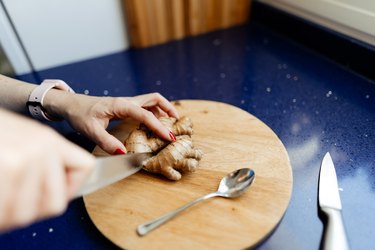
The thick, gnarled roots of the ginger plant (Zingiber officinale), hardy in U.S. Department of Agriculture plant hardiness zones 9b through 12, are among the earliest spices transported from Asia to Europe. Today, ginger roots and ginger juice are known for their health benefits, ranging from antibacterial activity to antioxidants that fight against diseases to nausea relief.
You can harvest your own ginger juice from the plump roots and save it for your morning smoothie or tea. Before embarking on a daily dose of ginger juice, consult with your health provider to ensure that it won't interfere with any of your medications or current health conditions.
Video of the Day
Video of the Day
Juicing Ginger Root
Select the freshest, plumpest ginger roots at the store. Scrub, peel, then grate the roots into a bowl. Put the ginger pieces into a cheesecloth bag and squeeze out the juice.
Alternatively, use an electric juicer to extract the ginger juice from the roots. You can also use a blender, but it dilutes the juice. Add chopped roots and 1 cup water or coconut water to the blender. Blend until smooth, then strain through a fine sieve or cheesecloth, pressing or squeezing to remove all of the juice possible from the pulp.
Refrigerating the Juice
Put the ginger juice in clean jars and close the lid tightly. Store it in the refrigerator for two to three days. Consider adding lemon juice to your ginger juice before refrigerating or freezing. Lemon juice is a natural preservative and adds a little bright citrus zest to the spicy ginger flavor.
In addition to drinking the ginger juice, you can add the juice and the grated shards from the root to your cakes, pies, homemade preserves, main dishes or meat glazes. Adjust the amount to accommodate for the stronger flavor; dried and ground spices are generally less pungent than freshly grated or juiced ginger.
Freezing Ginger Juice
Pour the ginger juice into a clean glass jar or plastic freezer container. Leave 1 1/2 inch headspace to allow for expansion when the juice freezes. Alternatively, pour the juice into ice cube trays and freeze. Once solid, pop the ginger juice cubes out of the trays and into resealable bags for freezer storage.
Ginger juice may be kept in the freezer for up to six months. When you need some juice, put a jar in the refrigerator and allow it to thaw. If frozen into cubes, the ginger juice is ready to blend into a smoothie along with other fruits, vegetables, yogurt and honey or sugar.
Making Ginger Juice Syrup
Another method of preserving ginger juice is by making a ginger juice syrup. When you mix 1/4 cup ginger syrup with 1 cup club soda or a sparkling water, it becomes a healthy homemade ginger ale. Refrigerate the syrup for up to a week or put it in the freezer for longer storage.
Combine 4 cups water in a large saucepan with 2 cups peeled and chopped or grated ginger root and the zest of two lemons. Squeeze the lemons and set the lemon juice aside. Bring the water to a boil, then turn the burner to medium-low and cook at a low boil for 10 minutes. Stir in 1 1/2 cups sugar or 3/4 cup each of white and brown sugar and add any additional spices, such as cinnamon sticks, cloves or mint leaves, then continue to simmer for 15 to 30 minutes.
Remove from the burner and allow to cool until lukewarm. Use a fine mesh strainer to strain the syrup into a bowl and mix in the reserved lemon juice. Set the ginger pieces aside for use in cooking or to make candied ginger. Let the syrup fully cool, then pour into a clean glass container and refrigerate up to two weeks.
Warning
While some sources recommend canning ginger juice using the hot water bath method, it is a low-acid herb/vegetable. Home canning is not recommended.